Analysis of Global Business Environment for Tufwell Glass
VerifiedAdded on 2023/01/18
|21
|6802
|39
Report
AI Summary
This report provides a comprehensive analysis of the global business environment, focusing on the case of Tufwell Glass, a UK-based glass processing company. The report explores key factors driving global commerce and trade, including cost, competition, and market expansion, while also utilizing PESTEL analysis to understand the influence of political, economic, social, technological, environmental, and legal factors. It examines the strategic challenges faced by multinational organizations, such as physical distance, cultural and language barriers, and supply chain complexities, and evaluates the impact of globalization on organizational governance, leadership, structure, culture, and functions. The report further analyzes the influences of ethical and sustainable globalization on organizational functions, explores effective decision-making processes in a global context, and assesses various internationalization routes for Tufwell Glass. Models like MnKinesy and Hofstede are used to support the analysis. The conclusion provides recommendations regarding the benefits and barriers of each international market entry route.
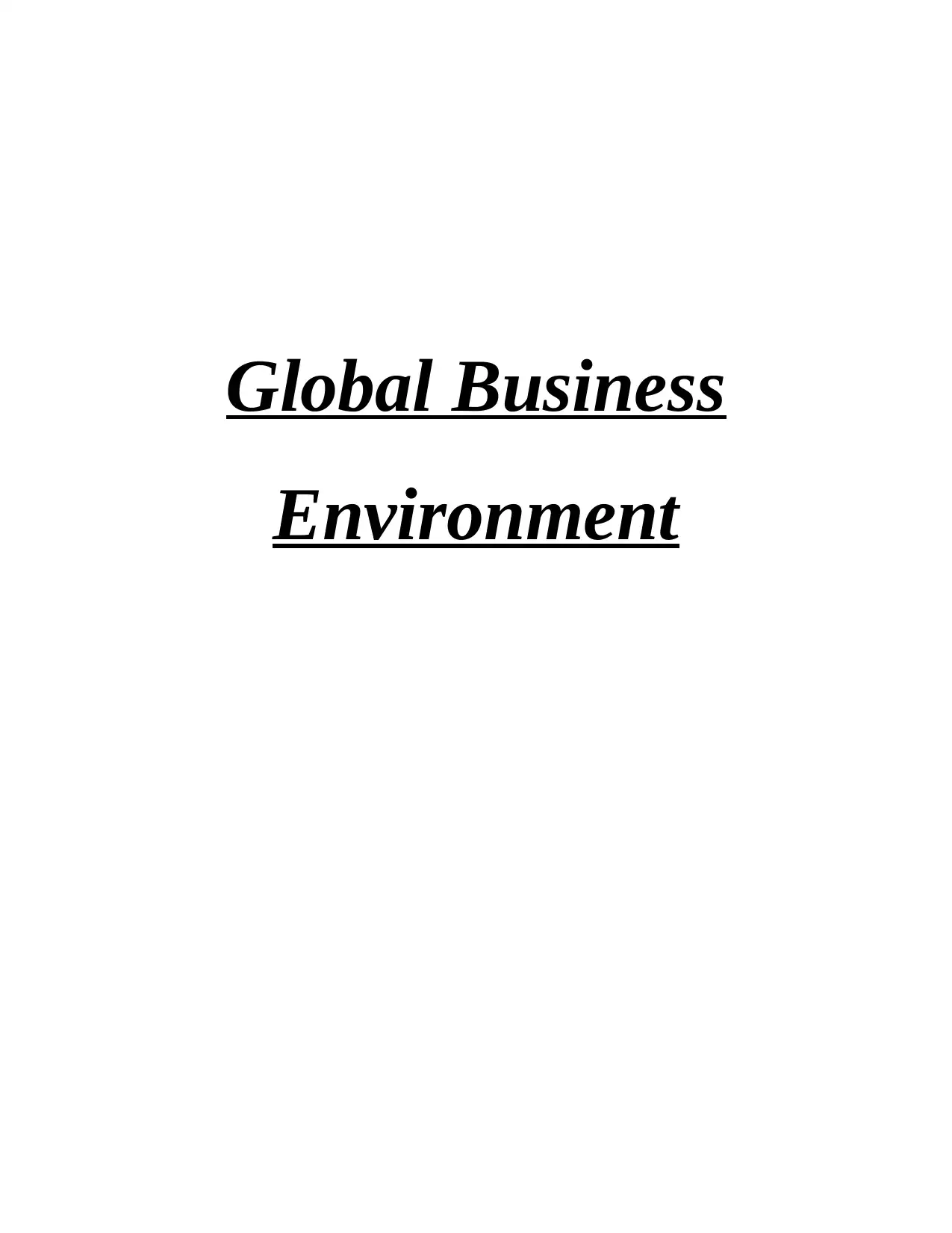
Global Business
Environment
Environment
Paraphrase This Document
Need a fresh take? Get an instant paraphrase of this document with our AI Paraphraser
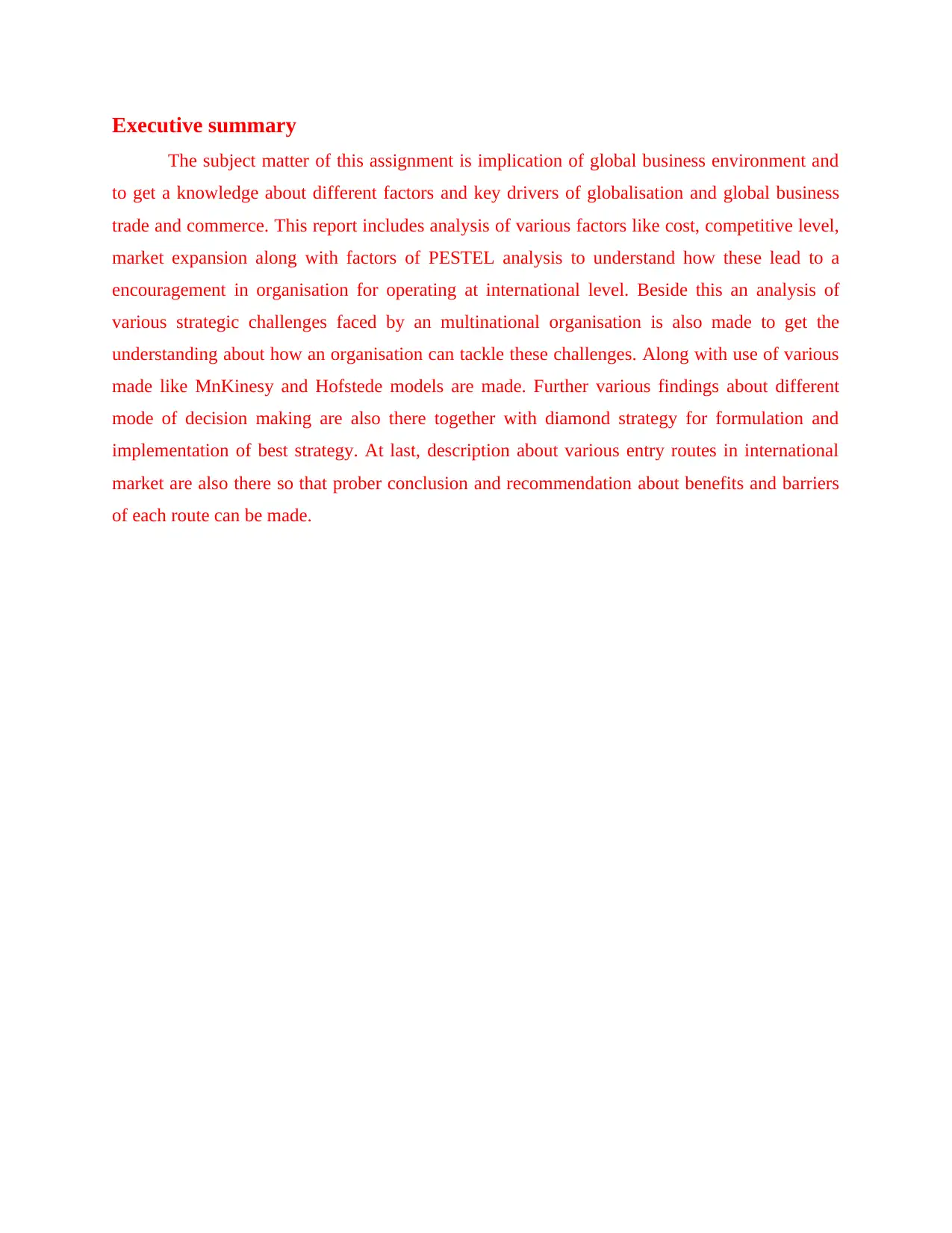
Executive summary
The subject matter of this assignment is implication of global business environment and
to get a knowledge about different factors and key drivers of globalisation and global business
trade and commerce. This report includes analysis of various factors like cost, competitive level,
market expansion along with factors of PESTEL analysis to understand how these lead to a
encouragement in organisation for operating at international level. Beside this an analysis of
various strategic challenges faced by an multinational organisation is also made to get the
understanding about how an organisation can tackle these challenges. Along with use of various
made like MnKinesy and Hofstede models are made. Further various findings about different
mode of decision making are also there together with diamond strategy for formulation and
implementation of best strategy. At last, description about various entry routes in international
market are also there so that prober conclusion and recommendation about benefits and barriers
of each route can be made.
The subject matter of this assignment is implication of global business environment and
to get a knowledge about different factors and key drivers of globalisation and global business
trade and commerce. This report includes analysis of various factors like cost, competitive level,
market expansion along with factors of PESTEL analysis to understand how these lead to a
encouragement in organisation for operating at international level. Beside this an analysis of
various strategic challenges faced by an multinational organisation is also made to get the
understanding about how an organisation can tackle these challenges. Along with use of various
made like MnKinesy and Hofstede models are made. Further various findings about different
mode of decision making are also there together with diamond strategy for formulation and
implementation of best strategy. At last, description about various entry routes in international
market are also there so that prober conclusion and recommendation about benefits and barriers
of each route can be made.
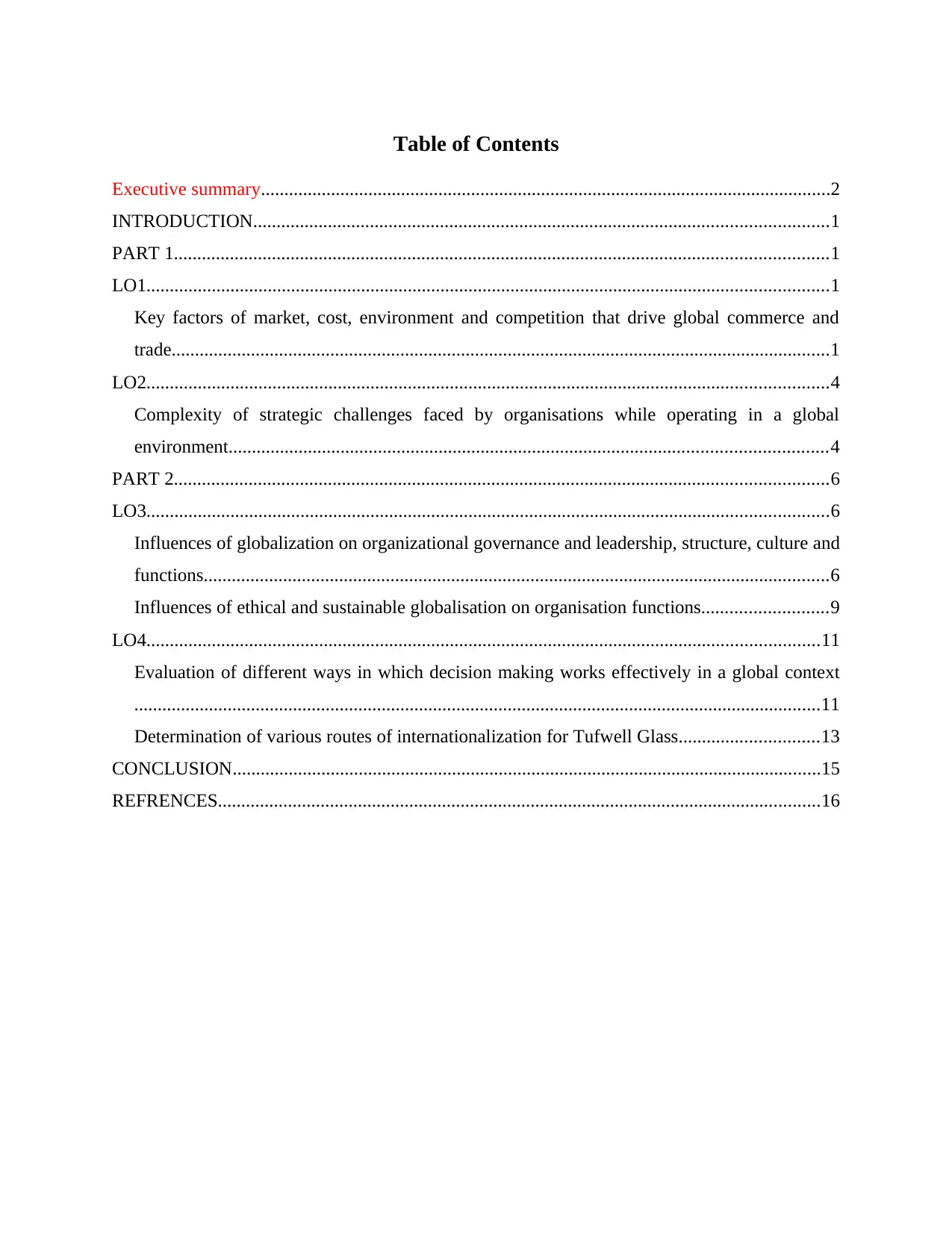
Table of Contents
Executive summary..........................................................................................................................2
INTRODUCTION...........................................................................................................................1
PART 1............................................................................................................................................1
LO1..................................................................................................................................................1
Key factors of market, cost, environment and competition that drive global commerce and
trade.............................................................................................................................................1
LO2..................................................................................................................................................4
Complexity of strategic challenges faced by organisations while operating in a global
environment................................................................................................................................4
PART 2............................................................................................................................................6
LO3..................................................................................................................................................6
Influences of globalization on organizational governance and leadership, structure, culture and
functions......................................................................................................................................6
Influences of ethical and sustainable globalisation on organisation functions...........................9
LO4................................................................................................................................................11
Evaluation of different ways in which decision making works effectively in a global context
...................................................................................................................................................11
Determination of various routes of internationalization for Tufwell Glass..............................13
CONCLUSION..............................................................................................................................15
REFRENCES.................................................................................................................................16
Executive summary..........................................................................................................................2
INTRODUCTION...........................................................................................................................1
PART 1............................................................................................................................................1
LO1..................................................................................................................................................1
Key factors of market, cost, environment and competition that drive global commerce and
trade.............................................................................................................................................1
LO2..................................................................................................................................................4
Complexity of strategic challenges faced by organisations while operating in a global
environment................................................................................................................................4
PART 2............................................................................................................................................6
LO3..................................................................................................................................................6
Influences of globalization on organizational governance and leadership, structure, culture and
functions......................................................................................................................................6
Influences of ethical and sustainable globalisation on organisation functions...........................9
LO4................................................................................................................................................11
Evaluation of different ways in which decision making works effectively in a global context
...................................................................................................................................................11
Determination of various routes of internationalization for Tufwell Glass..............................13
CONCLUSION..............................................................................................................................15
REFRENCES.................................................................................................................................16
⊘ This is a preview!⊘
Do you want full access?
Subscribe today to unlock all pages.

Trusted by 1+ million students worldwide

Paraphrase This Document
Need a fresh take? Get an instant paraphrase of this document with our AI Paraphraser
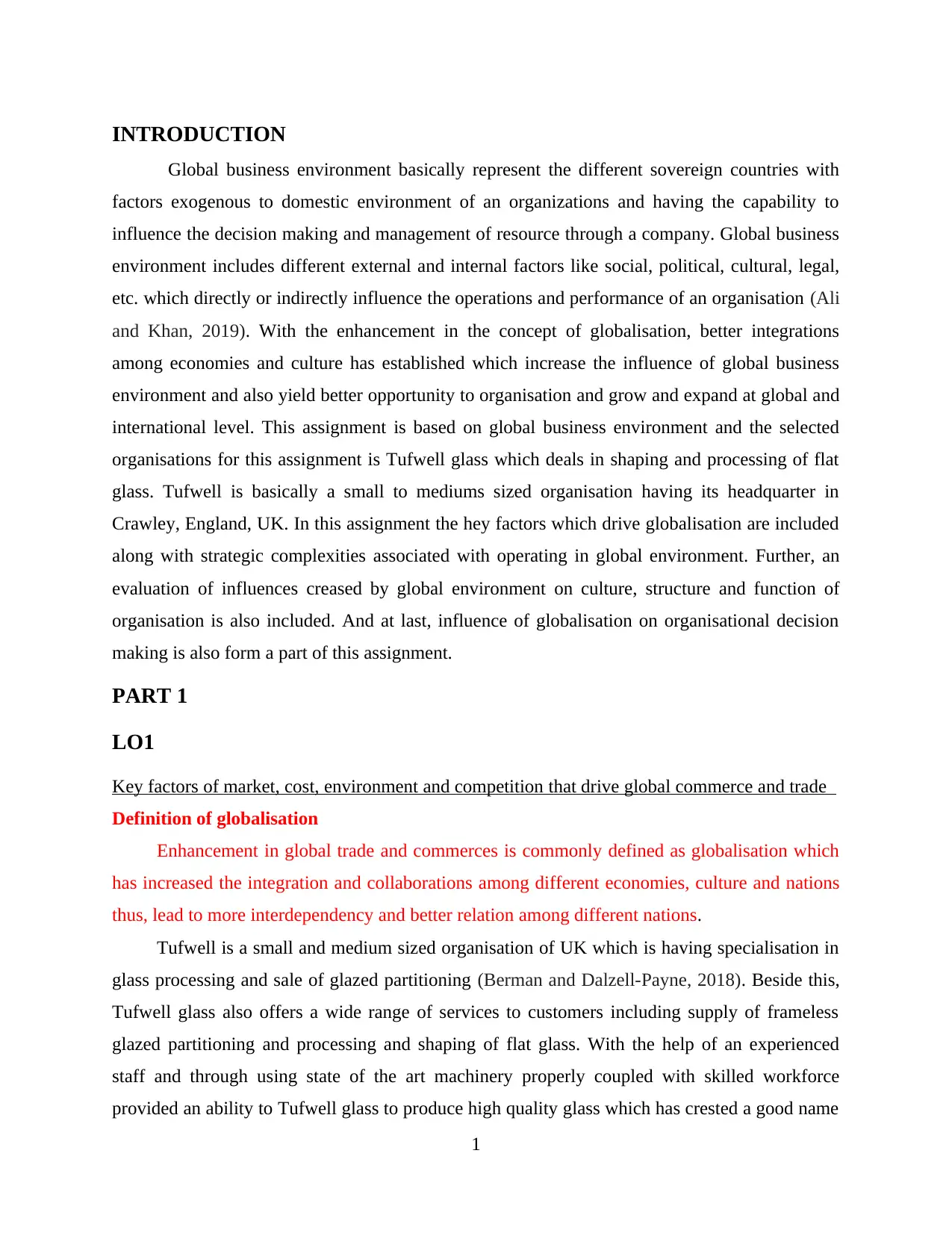
INTRODUCTION
Global business environment basically represent the different sovereign countries with
factors exogenous to domestic environment of an organizations and having the capability to
influence the decision making and management of resource through a company. Global business
environment includes different external and internal factors like social, political, cultural, legal,
etc. which directly or indirectly influence the operations and performance of an organisation (Ali
and Khan, 2019). With the enhancement in the concept of globalisation, better integrations
among economies and culture has established which increase the influence of global business
environment and also yield better opportunity to organisation and grow and expand at global and
international level. This assignment is based on global business environment and the selected
organisations for this assignment is Tufwell glass which deals in shaping and processing of flat
glass. Tufwell is basically a small to mediums sized organisation having its headquarter in
Crawley, England, UK. In this assignment the hey factors which drive globalisation are included
along with strategic complexities associated with operating in global environment. Further, an
evaluation of influences creased by global environment on culture, structure and function of
organisation is also included. And at last, influence of globalisation on organisational decision
making is also form a part of this assignment.
PART 1
LO1
Key factors of market, cost, environment and competition that drive global commerce and trade
Definition of globalisation
Enhancement in global trade and commerces is commonly defined as globalisation which
has increased the integration and collaborations among different economies, culture and nations
thus, lead to more interdependency and better relation among different nations.
Tufwell is a small and medium sized organisation of UK which is having specialisation in
glass processing and sale of glazed partitioning (Berman and Dalzell-Payne, 2018). Beside this,
Tufwell glass also offers a wide range of services to customers including supply of frameless
glazed partitioning and processing and shaping of flat glass. With the help of an experienced
staff and through using state of the art machinery properly coupled with skilled workforce
provided an ability to Tufwell glass to produce high quality glass which has crested a good name
1
Global business environment basically represent the different sovereign countries with
factors exogenous to domestic environment of an organizations and having the capability to
influence the decision making and management of resource through a company. Global business
environment includes different external and internal factors like social, political, cultural, legal,
etc. which directly or indirectly influence the operations and performance of an organisation (Ali
and Khan, 2019). With the enhancement in the concept of globalisation, better integrations
among economies and culture has established which increase the influence of global business
environment and also yield better opportunity to organisation and grow and expand at global and
international level. This assignment is based on global business environment and the selected
organisations for this assignment is Tufwell glass which deals in shaping and processing of flat
glass. Tufwell is basically a small to mediums sized organisation having its headquarter in
Crawley, England, UK. In this assignment the hey factors which drive globalisation are included
along with strategic complexities associated with operating in global environment. Further, an
evaluation of influences creased by global environment on culture, structure and function of
organisation is also included. And at last, influence of globalisation on organisational decision
making is also form a part of this assignment.
PART 1
LO1
Key factors of market, cost, environment and competition that drive global commerce and trade
Definition of globalisation
Enhancement in global trade and commerces is commonly defined as globalisation which
has increased the integration and collaborations among different economies, culture and nations
thus, lead to more interdependency and better relation among different nations.
Tufwell is a small and medium sized organisation of UK which is having specialisation in
glass processing and sale of glazed partitioning (Berman and Dalzell-Payne, 2018). Beside this,
Tufwell glass also offers a wide range of services to customers including supply of frameless
glazed partitioning and processing and shaping of flat glass. With the help of an experienced
staff and through using state of the art machinery properly coupled with skilled workforce
provided an ability to Tufwell glass to produce high quality glass which has crested a good name
1
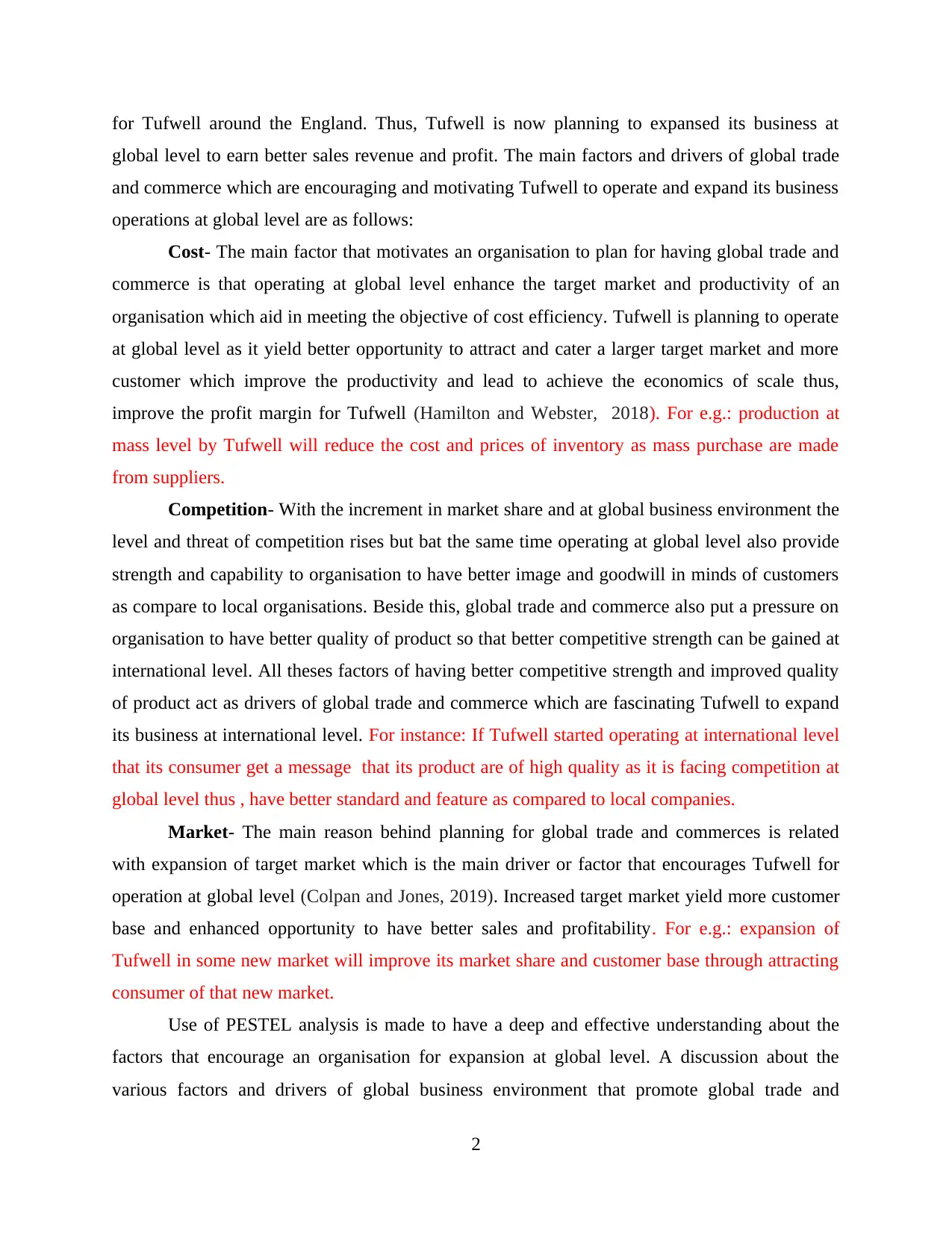
for Tufwell around the England. Thus, Tufwell is now planning to expansed its business at
global level to earn better sales revenue and profit. The main factors and drivers of global trade
and commerce which are encouraging and motivating Tufwell to operate and expand its business
operations at global level are as follows:
Cost- The main factor that motivates an organisation to plan for having global trade and
commerce is that operating at global level enhance the target market and productivity of an
organisation which aid in meeting the objective of cost efficiency. Tufwell is planning to operate
at global level as it yield better opportunity to attract and cater a larger target market and more
customer which improve the productivity and lead to achieve the economics of scale thus,
improve the profit margin for Tufwell (Hamilton and Webster, 2018). For e.g.: production at
mass level by Tufwell will reduce the cost and prices of inventory as mass purchase are made
from suppliers.
Competition- With the increment in market share and at global business environment the
level and threat of competition rises but bat the same time operating at global level also provide
strength and capability to organisation to have better image and goodwill in minds of customers
as compare to local organisations. Beside this, global trade and commerce also put a pressure on
organisation to have better quality of product so that better competitive strength can be gained at
international level. All theses factors of having better competitive strength and improved quality
of product act as drivers of global trade and commerce which are fascinating Tufwell to expand
its business at international level. For instance: If Tufwell started operating at international level
that its consumer get a message that its product are of high quality as it is facing competition at
global level thus , have better standard and feature as compared to local companies.
Market- The main reason behind planning for global trade and commerces is related
with expansion of target market which is the main driver or factor that encourages Tufwell for
operation at global level (Colpan and Jones, 2019). Increased target market yield more customer
base and enhanced opportunity to have better sales and profitability. For e.g.: expansion of
Tufwell in some new market will improve its market share and customer base through attracting
consumer of that new market.
Use of PESTEL analysis is made to have a deep and effective understanding about the
factors that encourage an organisation for expansion at global level. A discussion about the
various factors and drivers of global business environment that promote global trade and
2
global level to earn better sales revenue and profit. The main factors and drivers of global trade
and commerce which are encouraging and motivating Tufwell to operate and expand its business
operations at global level are as follows:
Cost- The main factor that motivates an organisation to plan for having global trade and
commerce is that operating at global level enhance the target market and productivity of an
organisation which aid in meeting the objective of cost efficiency. Tufwell is planning to operate
at global level as it yield better opportunity to attract and cater a larger target market and more
customer which improve the productivity and lead to achieve the economics of scale thus,
improve the profit margin for Tufwell (Hamilton and Webster, 2018). For e.g.: production at
mass level by Tufwell will reduce the cost and prices of inventory as mass purchase are made
from suppliers.
Competition- With the increment in market share and at global business environment the
level and threat of competition rises but bat the same time operating at global level also provide
strength and capability to organisation to have better image and goodwill in minds of customers
as compare to local organisations. Beside this, global trade and commerce also put a pressure on
organisation to have better quality of product so that better competitive strength can be gained at
international level. All theses factors of having better competitive strength and improved quality
of product act as drivers of global trade and commerce which are fascinating Tufwell to expand
its business at international level. For instance: If Tufwell started operating at international level
that its consumer get a message that its product are of high quality as it is facing competition at
global level thus , have better standard and feature as compared to local companies.
Market- The main reason behind planning for global trade and commerces is related
with expansion of target market which is the main driver or factor that encourages Tufwell for
operation at global level (Colpan and Jones, 2019). Increased target market yield more customer
base and enhanced opportunity to have better sales and profitability. For e.g.: expansion of
Tufwell in some new market will improve its market share and customer base through attracting
consumer of that new market.
Use of PESTEL analysis is made to have a deep and effective understanding about the
factors that encourage an organisation for expansion at global level. A discussion about the
various factors and drivers of global business environment that promote global trade and
2
⊘ This is a preview!⊘
Do you want full access?
Subscribe today to unlock all pages.

Trusted by 1+ million students worldwide
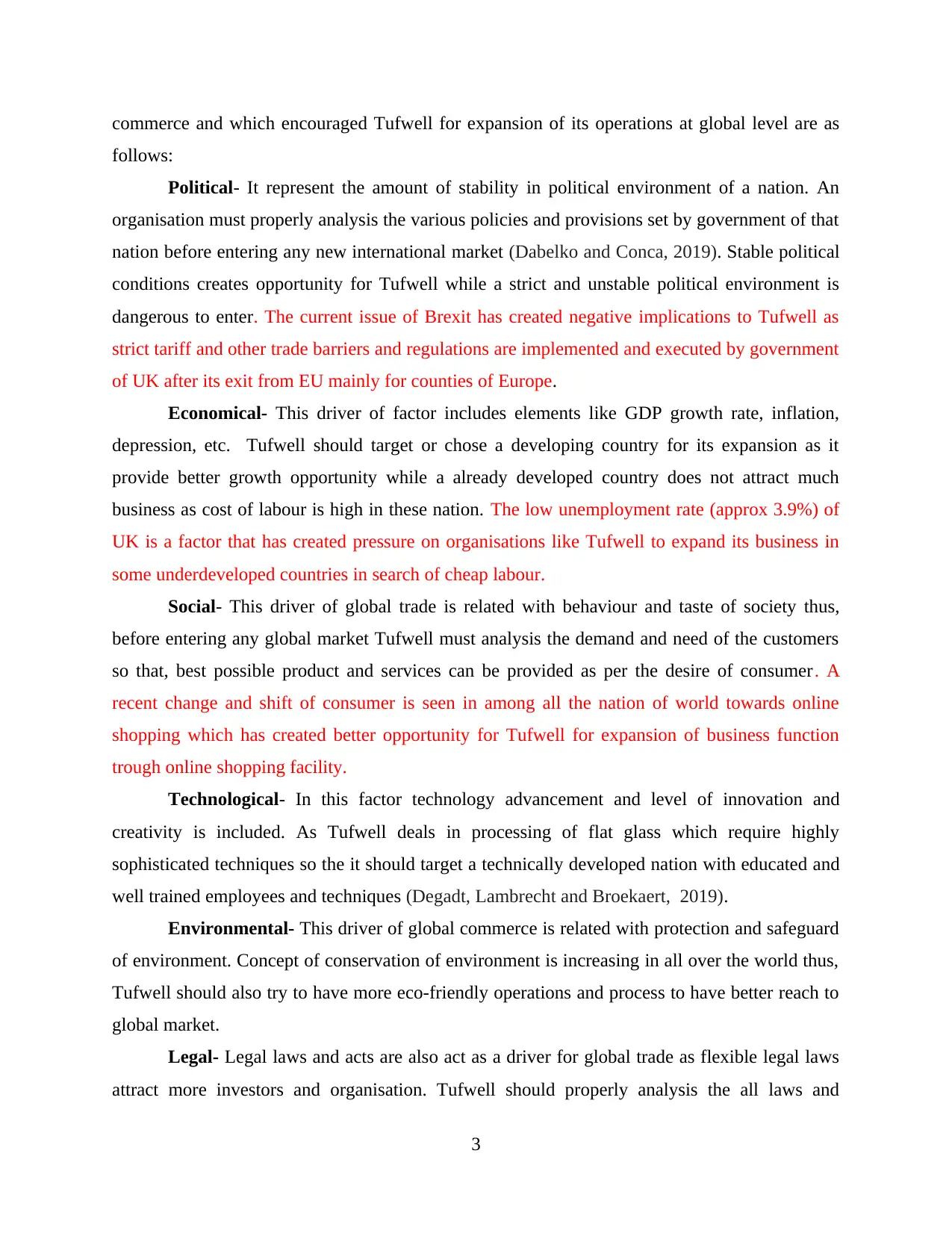
commerce and which encouraged Tufwell for expansion of its operations at global level are as
follows:
Political- It represent the amount of stability in political environment of a nation. An
organisation must properly analysis the various policies and provisions set by government of that
nation before entering any new international market (Dabelko and Conca, 2019). Stable political
conditions creates opportunity for Tufwell while a strict and unstable political environment is
dangerous to enter. The current issue of Brexit has created negative implications to Tufwell as
strict tariff and other trade barriers and regulations are implemented and executed by government
of UK after its exit from EU mainly for counties of Europe.
Economical- This driver of factor includes elements like GDP growth rate, inflation,
depression, etc. Tufwell should target or chose a developing country for its expansion as it
provide better growth opportunity while a already developed country does not attract much
business as cost of labour is high in these nation. The low unemployment rate (approx 3.9%) of
UK is a factor that has created pressure on organisations like Tufwell to expand its business in
some underdeveloped countries in search of cheap labour.
Social- This driver of global trade is related with behaviour and taste of society thus,
before entering any global market Tufwell must analysis the demand and need of the customers
so that, best possible product and services can be provided as per the desire of consumer. A
recent change and shift of consumer is seen in among all the nation of world towards online
shopping which has created better opportunity for Tufwell for expansion of business function
trough online shopping facility.
Technological- In this factor technology advancement and level of innovation and
creativity is included. As Tufwell deals in processing of flat glass which require highly
sophisticated techniques so the it should target a technically developed nation with educated and
well trained employees and techniques (Degadt, Lambrecht and Broekaert, 2019).
Environmental- This driver of global commerce is related with protection and safeguard
of environment. Concept of conservation of environment is increasing in all over the world thus,
Tufwell should also try to have more eco-friendly operations and process to have better reach to
global market.
Legal- Legal laws and acts are also act as a driver for global trade as flexible legal laws
attract more investors and organisation. Tufwell should properly analysis the all laws and
3
follows:
Political- It represent the amount of stability in political environment of a nation. An
organisation must properly analysis the various policies and provisions set by government of that
nation before entering any new international market (Dabelko and Conca, 2019). Stable political
conditions creates opportunity for Tufwell while a strict and unstable political environment is
dangerous to enter. The current issue of Brexit has created negative implications to Tufwell as
strict tariff and other trade barriers and regulations are implemented and executed by government
of UK after its exit from EU mainly for counties of Europe.
Economical- This driver of factor includes elements like GDP growth rate, inflation,
depression, etc. Tufwell should target or chose a developing country for its expansion as it
provide better growth opportunity while a already developed country does not attract much
business as cost of labour is high in these nation. The low unemployment rate (approx 3.9%) of
UK is a factor that has created pressure on organisations like Tufwell to expand its business in
some underdeveloped countries in search of cheap labour.
Social- This driver of global trade is related with behaviour and taste of society thus,
before entering any global market Tufwell must analysis the demand and need of the customers
so that, best possible product and services can be provided as per the desire of consumer. A
recent change and shift of consumer is seen in among all the nation of world towards online
shopping which has created better opportunity for Tufwell for expansion of business function
trough online shopping facility.
Technological- In this factor technology advancement and level of innovation and
creativity is included. As Tufwell deals in processing of flat glass which require highly
sophisticated techniques so the it should target a technically developed nation with educated and
well trained employees and techniques (Degadt, Lambrecht and Broekaert, 2019).
Environmental- This driver of global commerce is related with protection and safeguard
of environment. Concept of conservation of environment is increasing in all over the world thus,
Tufwell should also try to have more eco-friendly operations and process to have better reach to
global market.
Legal- Legal laws and acts are also act as a driver for global trade as flexible legal laws
attract more investors and organisation. Tufwell should properly analysis the all laws and
3
Paraphrase This Document
Need a fresh take? Get an instant paraphrase of this document with our AI Paraphraser
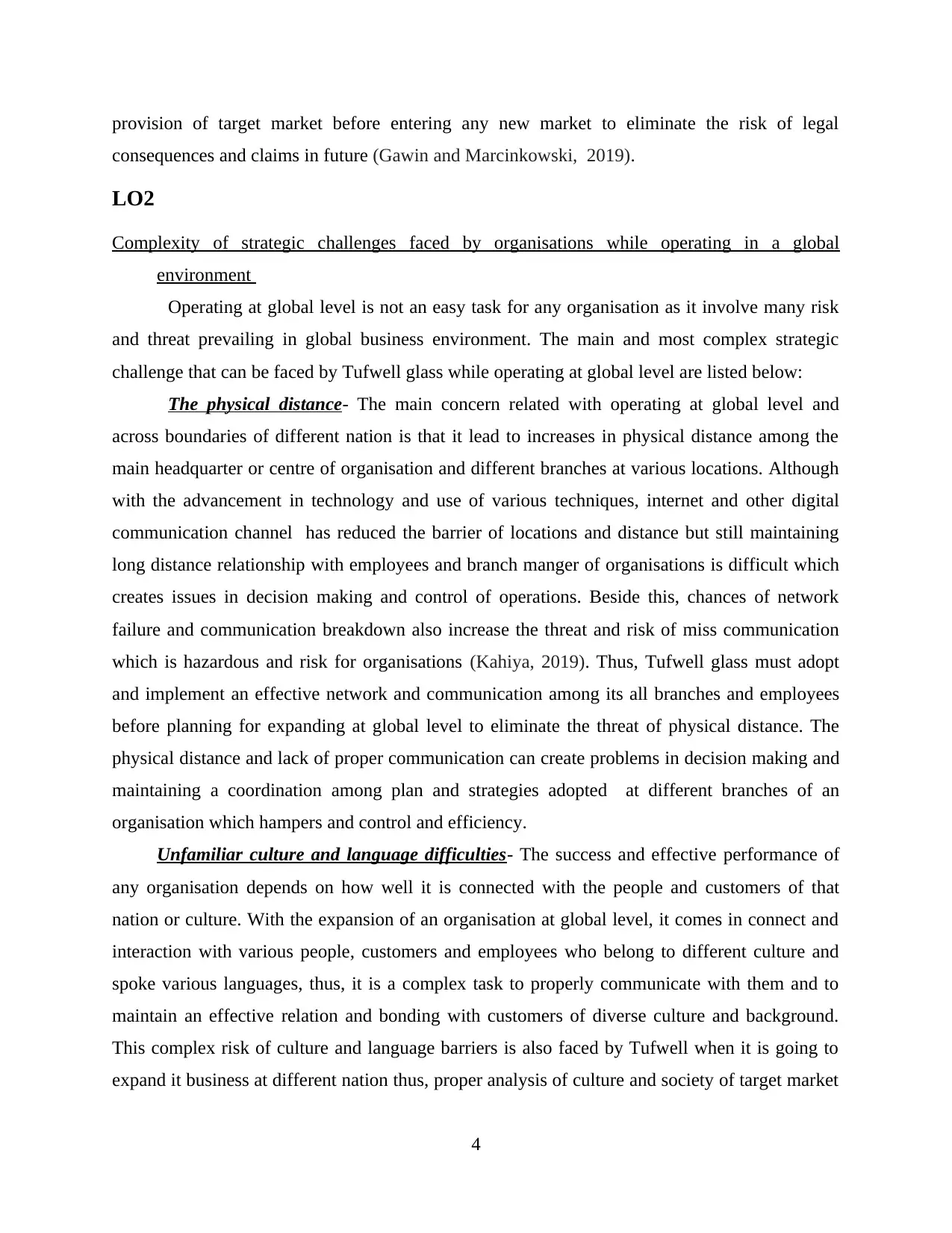
provision of target market before entering any new market to eliminate the risk of legal
consequences and claims in future (Gawin and Marcinkowski, 2019).
LO2
Complexity of strategic challenges faced by organisations while operating in a global
environment
Operating at global level is not an easy task for any organisation as it involve many risk
and threat prevailing in global business environment. The main and most complex strategic
challenge that can be faced by Tufwell glass while operating at global level are listed below:
The physical distance- The main concern related with operating at global level and
across boundaries of different nation is that it lead to increases in physical distance among the
main headquarter or centre of organisation and different branches at various locations. Although
with the advancement in technology and use of various techniques, internet and other digital
communication channel has reduced the barrier of locations and distance but still maintaining
long distance relationship with employees and branch manger of organisations is difficult which
creates issues in decision making and control of operations. Beside this, chances of network
failure and communication breakdown also increase the threat and risk of miss communication
which is hazardous and risk for organisations (Kahiya, 2019). Thus, Tufwell glass must adopt
and implement an effective network and communication among its all branches and employees
before planning for expanding at global level to eliminate the threat of physical distance. The
physical distance and lack of proper communication can create problems in decision making and
maintaining a coordination among plan and strategies adopted at different branches of an
organisation which hampers and control and efficiency.
Unfamiliar culture and language difficulties- The success and effective performance of
any organisation depends on how well it is connected with the people and customers of that
nation or culture. With the expansion of an organisation at global level, it comes in connect and
interaction with various people, customers and employees who belong to different culture and
spoke various languages, thus, it is a complex task to properly communicate with them and to
maintain an effective relation and bonding with customers of diverse culture and background.
This complex risk of culture and language barriers is also faced by Tufwell when it is going to
expand it business at different nation thus, proper analysis of culture and society of target market
4
consequences and claims in future (Gawin and Marcinkowski, 2019).
LO2
Complexity of strategic challenges faced by organisations while operating in a global
environment
Operating at global level is not an easy task for any organisation as it involve many risk
and threat prevailing in global business environment. The main and most complex strategic
challenge that can be faced by Tufwell glass while operating at global level are listed below:
The physical distance- The main concern related with operating at global level and
across boundaries of different nation is that it lead to increases in physical distance among the
main headquarter or centre of organisation and different branches at various locations. Although
with the advancement in technology and use of various techniques, internet and other digital
communication channel has reduced the barrier of locations and distance but still maintaining
long distance relationship with employees and branch manger of organisations is difficult which
creates issues in decision making and control of operations. Beside this, chances of network
failure and communication breakdown also increase the threat and risk of miss communication
which is hazardous and risk for organisations (Kahiya, 2019). Thus, Tufwell glass must adopt
and implement an effective network and communication among its all branches and employees
before planning for expanding at global level to eliminate the threat of physical distance. The
physical distance and lack of proper communication can create problems in decision making and
maintaining a coordination among plan and strategies adopted at different branches of an
organisation which hampers and control and efficiency.
Unfamiliar culture and language difficulties- The success and effective performance of
any organisation depends on how well it is connected with the people and customers of that
nation or culture. With the expansion of an organisation at global level, it comes in connect and
interaction with various people, customers and employees who belong to different culture and
spoke various languages, thus, it is a complex task to properly communicate with them and to
maintain an effective relation and bonding with customers of diverse culture and background.
This complex risk of culture and language barriers is also faced by Tufwell when it is going to
expand it business at different nation thus, proper analysis of culture and society of target market
4
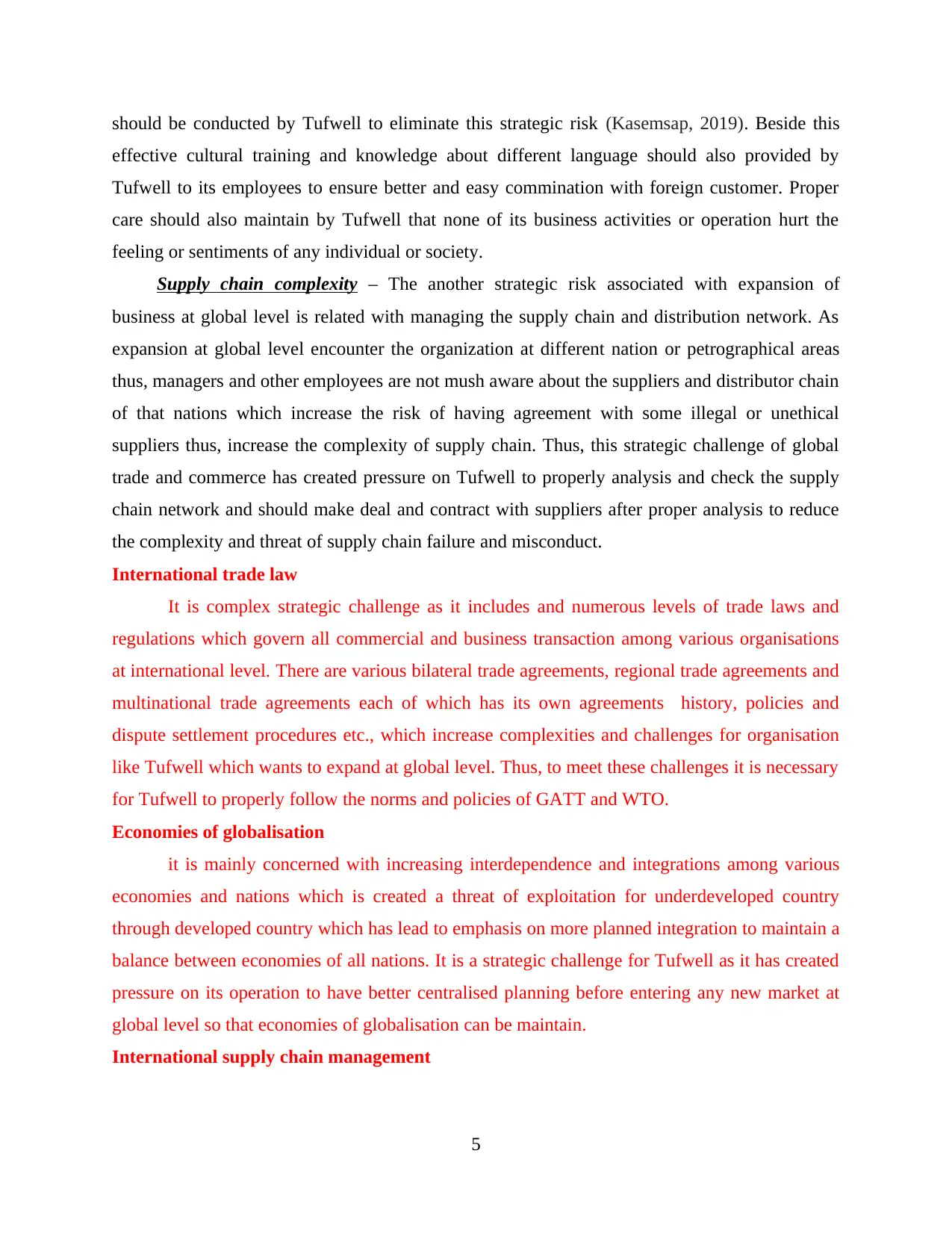
should be conducted by Tufwell to eliminate this strategic risk (Kasemsap, 2019). Beside this
effective cultural training and knowledge about different language should also provided by
Tufwell to its employees to ensure better and easy commination with foreign customer. Proper
care should also maintain by Tufwell that none of its business activities or operation hurt the
feeling or sentiments of any individual or society.
Supply chain complexity – The another strategic risk associated with expansion of
business at global level is related with managing the supply chain and distribution network. As
expansion at global level encounter the organization at different nation or petrographical areas
thus, managers and other employees are not mush aware about the suppliers and distributor chain
of that nations which increase the risk of having agreement with some illegal or unethical
suppliers thus, increase the complexity of supply chain. Thus, this strategic challenge of global
trade and commerce has created pressure on Tufwell to properly analysis and check the supply
chain network and should make deal and contract with suppliers after proper analysis to reduce
the complexity and threat of supply chain failure and misconduct.
International trade law
It is complex strategic challenge as it includes and numerous levels of trade laws and
regulations which govern all commercial and business transaction among various organisations
at international level. There are various bilateral trade agreements, regional trade agreements and
multinational trade agreements each of which has its own agreements history, policies and
dispute settlement procedures etc., which increase complexities and challenges for organisation
like Tufwell which wants to expand at global level. Thus, to meet these challenges it is necessary
for Tufwell to properly follow the norms and policies of GATT and WTO.
Economies of globalisation
it is mainly concerned with increasing interdependence and integrations among various
economies and nations which is created a threat of exploitation for underdeveloped country
through developed country which has lead to emphasis on more planned integration to maintain a
balance between economies of all nations. It is a strategic challenge for Tufwell as it has created
pressure on its operation to have better centralised planning before entering any new market at
global level so that economies of globalisation can be maintain.
International supply chain management
5
effective cultural training and knowledge about different language should also provided by
Tufwell to its employees to ensure better and easy commination with foreign customer. Proper
care should also maintain by Tufwell that none of its business activities or operation hurt the
feeling or sentiments of any individual or society.
Supply chain complexity – The another strategic risk associated with expansion of
business at global level is related with managing the supply chain and distribution network. As
expansion at global level encounter the organization at different nation or petrographical areas
thus, managers and other employees are not mush aware about the suppliers and distributor chain
of that nations which increase the risk of having agreement with some illegal or unethical
suppliers thus, increase the complexity of supply chain. Thus, this strategic challenge of global
trade and commerce has created pressure on Tufwell to properly analysis and check the supply
chain network and should make deal and contract with suppliers after proper analysis to reduce
the complexity and threat of supply chain failure and misconduct.
International trade law
It is complex strategic challenge as it includes and numerous levels of trade laws and
regulations which govern all commercial and business transaction among various organisations
at international level. There are various bilateral trade agreements, regional trade agreements and
multinational trade agreements each of which has its own agreements history, policies and
dispute settlement procedures etc., which increase complexities and challenges for organisation
like Tufwell which wants to expand at global level. Thus, to meet these challenges it is necessary
for Tufwell to properly follow the norms and policies of GATT and WTO.
Economies of globalisation
it is mainly concerned with increasing interdependence and integrations among various
economies and nations which is created a threat of exploitation for underdeveloped country
through developed country which has lead to emphasis on more planned integration to maintain a
balance between economies of all nations. It is a strategic challenge for Tufwell as it has created
pressure on its operation to have better centralised planning before entering any new market at
global level so that economies of globalisation can be maintain.
International supply chain management
5
⊘ This is a preview!⊘
Do you want full access?
Subscribe today to unlock all pages.

Trusted by 1+ million students worldwide
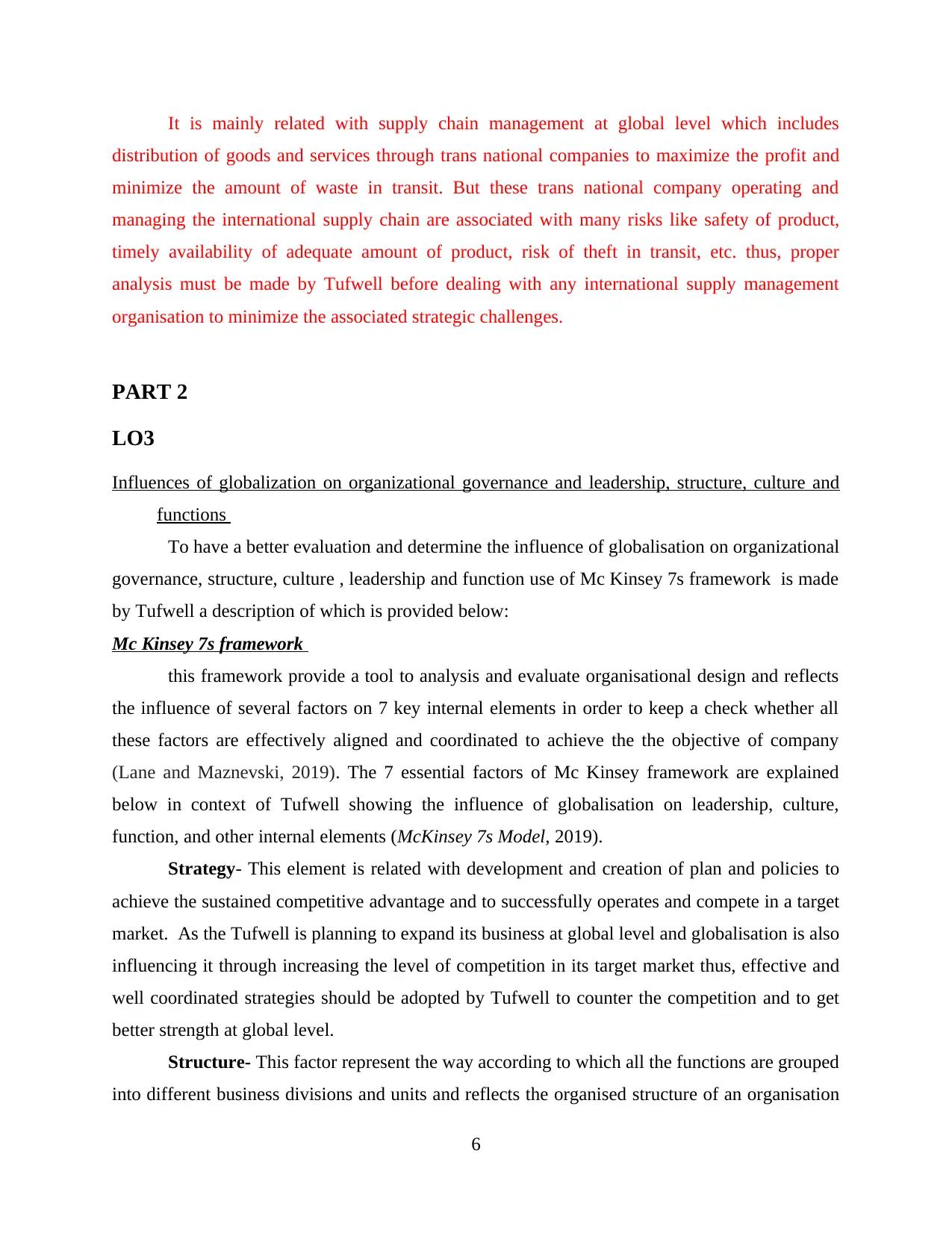
It is mainly related with supply chain management at global level which includes
distribution of goods and services through trans national companies to maximize the profit and
minimize the amount of waste in transit. But these trans national company operating and
managing the international supply chain are associated with many risks like safety of product,
timely availability of adequate amount of product, risk of theft in transit, etc. thus, proper
analysis must be made by Tufwell before dealing with any international supply management
organisation to minimize the associated strategic challenges.
PART 2
LO3
Influences of globalization on organizational governance and leadership, structure, culture and
functions
To have a better evaluation and determine the influence of globalisation on organizational
governance, structure, culture , leadership and function use of Mc Kinsey 7s framework is made
by Tufwell a description of which is provided below:
Mc Kinsey 7s framework
this framework provide a tool to analysis and evaluate organisational design and reflects
the influence of several factors on 7 key internal elements in order to keep a check whether all
these factors are effectively aligned and coordinated to achieve the the objective of company
(Lane and Maznevski, 2019). The 7 essential factors of Mc Kinsey framework are explained
below in context of Tufwell showing the influence of globalisation on leadership, culture,
function, and other internal elements (McKinsey 7s Model, 2019).
Strategy- This element is related with development and creation of plan and policies to
achieve the sustained competitive advantage and to successfully operates and compete in a target
market. As the Tufwell is planning to expand its business at global level and globalisation is also
influencing it through increasing the level of competition in its target market thus, effective and
well coordinated strategies should be adopted by Tufwell to counter the competition and to get
better strength at global level.
Structure- This factor represent the way according to which all the functions are grouped
into different business divisions and units and reflects the organised structure of an organisation
6
distribution of goods and services through trans national companies to maximize the profit and
minimize the amount of waste in transit. But these trans national company operating and
managing the international supply chain are associated with many risks like safety of product,
timely availability of adequate amount of product, risk of theft in transit, etc. thus, proper
analysis must be made by Tufwell before dealing with any international supply management
organisation to minimize the associated strategic challenges.
PART 2
LO3
Influences of globalization on organizational governance and leadership, structure, culture and
functions
To have a better evaluation and determine the influence of globalisation on organizational
governance, structure, culture , leadership and function use of Mc Kinsey 7s framework is made
by Tufwell a description of which is provided below:
Mc Kinsey 7s framework
this framework provide a tool to analysis and evaluate organisational design and reflects
the influence of several factors on 7 key internal elements in order to keep a check whether all
these factors are effectively aligned and coordinated to achieve the the objective of company
(Lane and Maznevski, 2019). The 7 essential factors of Mc Kinsey framework are explained
below in context of Tufwell showing the influence of globalisation on leadership, culture,
function, and other internal elements (McKinsey 7s Model, 2019).
Strategy- This element is related with development and creation of plan and policies to
achieve the sustained competitive advantage and to successfully operates and compete in a target
market. As the Tufwell is planning to expand its business at global level and globalisation is also
influencing it through increasing the level of competition in its target market thus, effective and
well coordinated strategies should be adopted by Tufwell to counter the competition and to get
better strength at global level.
Structure- This factor represent the way according to which all the functions are grouped
into different business divisions and units and reflects the organised structure of an organisation
6
Paraphrase This Document
Need a fresh take? Get an instant paraphrase of this document with our AI Paraphraser
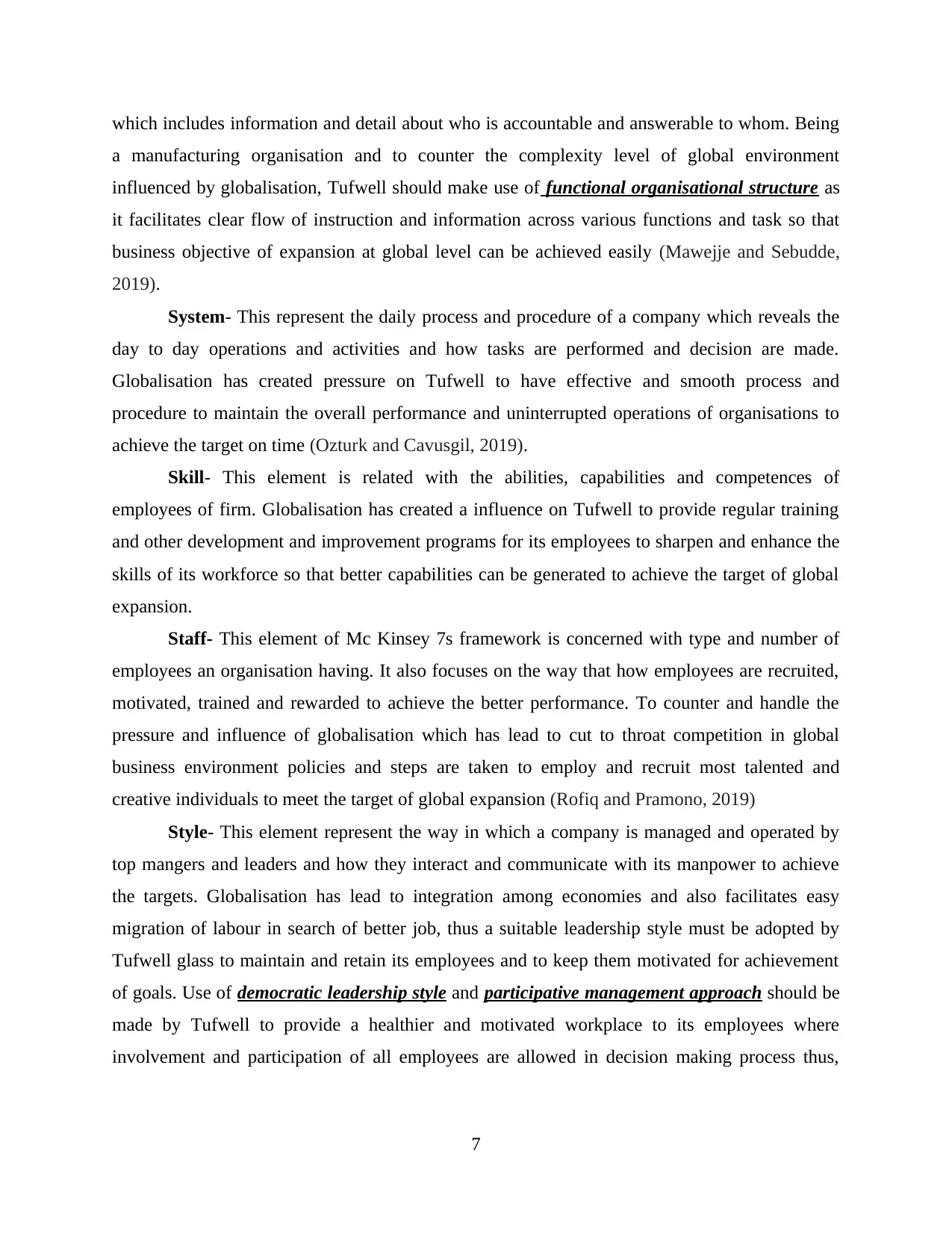
which includes information and detail about who is accountable and answerable to whom. Being
a manufacturing organisation and to counter the complexity level of global environment
influenced by globalisation, Tufwell should make use of functional organisational structure as
it facilitates clear flow of instruction and information across various functions and task so that
business objective of expansion at global level can be achieved easily (Mawejje and Sebudde,
2019).
System- This represent the daily process and procedure of a company which reveals the
day to day operations and activities and how tasks are performed and decision are made.
Globalisation has created pressure on Tufwell to have effective and smooth process and
procedure to maintain the overall performance and uninterrupted operations of organisations to
achieve the target on time (Ozturk and Cavusgil, 2019).
Skill- This element is related with the abilities, capabilities and competences of
employees of firm. Globalisation has created a influence on Tufwell to provide regular training
and other development and improvement programs for its employees to sharpen and enhance the
skills of its workforce so that better capabilities can be generated to achieve the target of global
expansion.
Staff- This element of Mc Kinsey 7s framework is concerned with type and number of
employees an organisation having. It also focuses on the way that how employees are recruited,
motivated, trained and rewarded to achieve the better performance. To counter and handle the
pressure and influence of globalisation which has lead to cut to throat competition in global
business environment policies and steps are taken to employ and recruit most talented and
creative individuals to meet the target of global expansion (Rofiq and Pramono, 2019)
Style- This element represent the way in which a company is managed and operated by
top mangers and leaders and how they interact and communicate with its manpower to achieve
the targets. Globalisation has lead to integration among economies and also facilitates easy
migration of labour in search of better job, thus a suitable leadership style must be adopted by
Tufwell glass to maintain and retain its employees and to keep them motivated for achievement
of goals. Use of democratic leadership style and participative management approach should be
made by Tufwell to provide a healthier and motivated workplace to its employees where
involvement and participation of all employees are allowed in decision making process thus,
7
a manufacturing organisation and to counter the complexity level of global environment
influenced by globalisation, Tufwell should make use of functional organisational structure as
it facilitates clear flow of instruction and information across various functions and task so that
business objective of expansion at global level can be achieved easily (Mawejje and Sebudde,
2019).
System- This represent the daily process and procedure of a company which reveals the
day to day operations and activities and how tasks are performed and decision are made.
Globalisation has created pressure on Tufwell to have effective and smooth process and
procedure to maintain the overall performance and uninterrupted operations of organisations to
achieve the target on time (Ozturk and Cavusgil, 2019).
Skill- This element is related with the abilities, capabilities and competences of
employees of firm. Globalisation has created a influence on Tufwell to provide regular training
and other development and improvement programs for its employees to sharpen and enhance the
skills of its workforce so that better capabilities can be generated to achieve the target of global
expansion.
Staff- This element of Mc Kinsey 7s framework is concerned with type and number of
employees an organisation having. It also focuses on the way that how employees are recruited,
motivated, trained and rewarded to achieve the better performance. To counter and handle the
pressure and influence of globalisation which has lead to cut to throat competition in global
business environment policies and steps are taken to employ and recruit most talented and
creative individuals to meet the target of global expansion (Rofiq and Pramono, 2019)
Style- This element represent the way in which a company is managed and operated by
top mangers and leaders and how they interact and communicate with its manpower to achieve
the targets. Globalisation has lead to integration among economies and also facilitates easy
migration of labour in search of better job, thus a suitable leadership style must be adopted by
Tufwell glass to maintain and retain its employees and to keep them motivated for achievement
of goals. Use of democratic leadership style and participative management approach should be
made by Tufwell to provide a healthier and motivated workplace to its employees where
involvement and participation of all employees are allowed in decision making process thus,
7
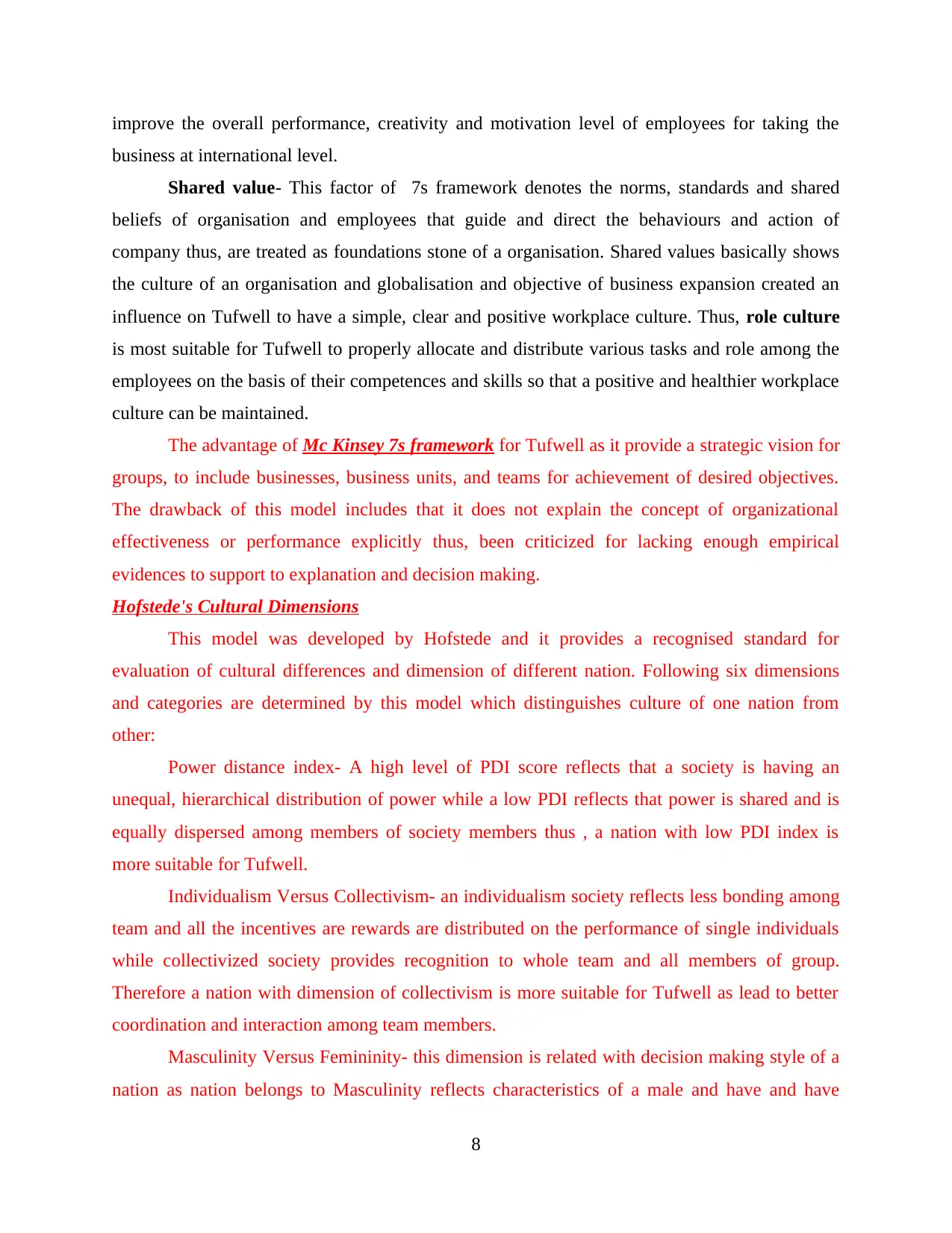
improve the overall performance, creativity and motivation level of employees for taking the
business at international level.
Shared value- This factor of 7s framework denotes the norms, standards and shared
beliefs of organisation and employees that guide and direct the behaviours and action of
company thus, are treated as foundations stone of a organisation. Shared values basically shows
the culture of an organisation and globalisation and objective of business expansion created an
influence on Tufwell to have a simple, clear and positive workplace culture. Thus, role culture
is most suitable for Tufwell to properly allocate and distribute various tasks and role among the
employees on the basis of their competences and skills so that a positive and healthier workplace
culture can be maintained.
The advantage of Mc Kinsey 7s framework for Tufwell as it provide a strategic vision for
groups, to include businesses, business units, and teams for achievement of desired objectives.
The drawback of this model includes that it does not explain the concept of organizational
effectiveness or performance explicitly thus, been criticized for lacking enough empirical
evidences to support to explanation and decision making.
Hofstede's Cultural Dimensions
This model was developed by Hofstede and it provides a recognised standard for
evaluation of cultural differences and dimension of different nation. Following six dimensions
and categories are determined by this model which distinguishes culture of one nation from
other:
Power distance index- A high level of PDI score reflects that a society is having an
unequal, hierarchical distribution of power while a low PDI reflects that power is shared and is
equally dispersed among members of society members thus , a nation with low PDI index is
more suitable for Tufwell.
Individualism Versus Collectivism- an individualism society reflects less bonding among
team and all the incentives are rewards are distributed on the performance of single individuals
while collectivized society provides recognition to whole team and all members of group.
Therefore a nation with dimension of collectivism is more suitable for Tufwell as lead to better
coordination and interaction among team members.
Masculinity Versus Femininity- this dimension is related with decision making style of a
nation as nation belongs to Masculinity reflects characteristics of a male and have and have
8
business at international level.
Shared value- This factor of 7s framework denotes the norms, standards and shared
beliefs of organisation and employees that guide and direct the behaviours and action of
company thus, are treated as foundations stone of a organisation. Shared values basically shows
the culture of an organisation and globalisation and objective of business expansion created an
influence on Tufwell to have a simple, clear and positive workplace culture. Thus, role culture
is most suitable for Tufwell to properly allocate and distribute various tasks and role among the
employees on the basis of their competences and skills so that a positive and healthier workplace
culture can be maintained.
The advantage of Mc Kinsey 7s framework for Tufwell as it provide a strategic vision for
groups, to include businesses, business units, and teams for achievement of desired objectives.
The drawback of this model includes that it does not explain the concept of organizational
effectiveness or performance explicitly thus, been criticized for lacking enough empirical
evidences to support to explanation and decision making.
Hofstede's Cultural Dimensions
This model was developed by Hofstede and it provides a recognised standard for
evaluation of cultural differences and dimension of different nation. Following six dimensions
and categories are determined by this model which distinguishes culture of one nation from
other:
Power distance index- A high level of PDI score reflects that a society is having an
unequal, hierarchical distribution of power while a low PDI reflects that power is shared and is
equally dispersed among members of society members thus , a nation with low PDI index is
more suitable for Tufwell.
Individualism Versus Collectivism- an individualism society reflects less bonding among
team and all the incentives are rewards are distributed on the performance of single individuals
while collectivized society provides recognition to whole team and all members of group.
Therefore a nation with dimension of collectivism is more suitable for Tufwell as lead to better
coordination and interaction among team members.
Masculinity Versus Femininity- this dimension is related with decision making style of a
nation as nation belongs to Masculinity reflects characteristics of a male and have and have
8
⊘ This is a preview!⊘
Do you want full access?
Subscribe today to unlock all pages.

Trusted by 1+ million students worldwide
1 out of 21
Related Documents
Your All-in-One AI-Powered Toolkit for Academic Success.
+13062052269
info@desklib.com
Available 24*7 on WhatsApp / Email
![[object Object]](/_next/static/media/star-bottom.7253800d.svg)
Unlock your academic potential
Copyright © 2020–2026 A2Z Services. All Rights Reserved. Developed and managed by ZUCOL.





